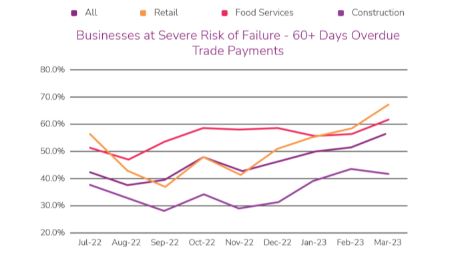As Aussies cut back on their spending and inflation keeps input costs like labour high, Aussie businesses are increasingly feeling the pinch.
- Credit agency illion says overdue invoices and debt collections are on the rise for Aussie businesses.
- High input costs and declining consumer spending could spell more trouble in the second half of the year.
- The food, retail and construction industries look particularly vulnerable.
According to credit agency illion, business failure risk is trending higher, with little sign of relief in the near term.
The retail, food and construction sectors are looking particularly vulnerable, based on trade invoice data from illion which holds business information on over eight million commercial entities.
According to Barrett Hasseldine, Head of Modelling at illion, about 6% of all trade invoices between Australian businesses were more than 60 days overdue in March 2023.
However, among those three high risk sectors, 57% of all invoices were overdue, up from 42% in July 2022.
More than two thirds (68%) of invoices in the retail sector are paid after more than 60 days, while 62% in the food industry and 42% in construction are paid late.
Mr Hasseldine said this has also translated into a huge increase in debt collections among these sectors.
"[The construction industry] has seen a threefold rise in daily collections activity in quarter-one 2023, compared with the previous nine months," Mr Hasseldine said.
"Similarly, the retail and food services sectors have had 75% rises in collections activity. This contrasts with the Professional Services and Financial Services sectors where we have seen no change in collections activity over the last 12 months.”

Retail spending on the chopping block for cash strapped Aussies?
High interest rates mean many Aussies have cut back on their non essential spending, which has been bad news for the retail sector.
Mr Hasseldine said the growing number of overdue invoices suggested retail businesses were especially hurt by the economic shocks at the start of the year.
"[Retail businesses may have been hurt by] falling revenues post-Christmas and rising input costs from shop rents, power prices, and inventory costs," he said.
The data from illion is from March, and since then, discretionary spending has dropped for three successive months, so it's unlikely there's been much respite for Aussie retailers.
NAB's latest business conditions survey revealed wage bills are weighing on business sentiment.
“The rise in labour costs in July coincided with a pickup in the survey’s price growth measures, suggesting some of wage adjustments in the new financial year might have been passed through to prices immediately,” NAB chief economist Alan Oster said.
“However, when we look at the detail, the relationship between labour costs and prices is not simple and many firms that experienced a big rise in labour costs did not increase their prices.”
Material and labour costs hurting construction
The construction industry was one of the sectors most affected by the pandemic.
Lockdowns and restrictions saw huge delays on construction projects, which led to a backlog of work still being worked through.
On top of this, CoreLogic’s Cordell Construction Cost Index (CCCI) found construction related expenses rose 11.9% throughout 2022, the highest on record, which Dr Diawasti Mardiasmo, Chief Economist at PRD Real Estate, said could also be at least partly attributed to Covid19.
"We are quite reliant on China for our construction materials, and for a while China had its zero Covid policy, meaning that many of its manufacturing, plants, shipping docks, etc were regularly closed depending on COVID cases,” Dr Mardiasmo told InfoChoice Group.
Ms Hasseldine said the recent rise in overdue payments could also likely be attributed to high labour costs and fixed contracts.
A fixed contract on a construction project means a price is agreed at the start, and can't be changed once the project starts, so if material and labour costs or delays mean the project becomes more expensive, the construction company can take a hit on revenue.
"Are we about to see a spike in Aussie businesses going under?" was originally published on Savings.com.au and was republished with permission.
